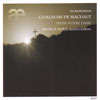Machaut Messe de Nostre Dame
A slow approach to a recording entering a crowded Machaut Mass market
View record and artist detailsRecord and Artist Details
Composer or Director: Philippe de Vitry, Anonymous, Bernard de Cluny, Guillaume de Machaut, Gilles D'Orléans, F. Andrieu, Pierre de Bruges
Genre:
Vocal
Label: Aeon
Magazine Review Date: 2/2011
Media Format: CD or Download
Media Runtime: 76
Mastering:
Stereo
DDD
Catalogue Number: AECD1093

Tracks:
| Composition | Artist Credit |
|---|---|
| Gratissima virginis/Vos qui admiramini/Gaude glori |
Philippe de Vitry, Composer
Philippe de Vitry, Composer Ensemble Musica Nova Lucien Kandel, Conductor |
| Adesto |
Anonymous, Composer
Anonymous, Composer Joseph Rassam, Organ |
| Impudenter circumivi/Virtutibus laudabilis |
Philippe de Vitry, Composer
Philippe de Vitry, Composer Ensemble Musica Nova Lucien Kandel, Conductor |
| Musicalis sciencia/Sciencie laudabili |
Pierre de Bruges, Composer
Ensemble Musica Nova Lucien Kandel, Conductor Pierre de Bruges, Composer |
| Alma polis Regio/Axe policum artica |
Gilles D'Orléans, Composer
Ensemble Musica Nova Gilles D'Orléans, Composer Lucien Kandel, Conductor |
| Apollinis eclipsatur/pantheon abluitur |
Bernard de Cluny, Composer
Bernard de Cluny, Composer Ensemble Musica Nova Lucien Kandel, Conductor |
| Zodiacum signis illustrantibus/In omnem terram tribum |
Anonymous, Composer
Anonymous, Composer Joseph Rassam, Organ |
| Messe de Nostre Dame |
Guillaume de Machaut, Composer
Ensemble Musica Nova Guillaume de Machaut, Composer Lucien Kandel, Conductor |
| Benedicamus Domino |
Anonymous, Composer
Anonymous, Composer Joseph Rassam, Organ |
| Armes, amours/O flour des flours |
F. Andrieu, Composer
Ensemble Musica Nova F. Andrieu, Composer Lucien Kandel, Conductor |
Author: Fabrice Fitch
To my ear, Musica Nova’s sound is less well suited to Machaut or Vitry than it was to Ockeghem. A clue to the reason is the success of the three male soloists in tackling the motet Musicalis sciencia: I freely confess to feeling that single voices do this repertory incomparably better justice – a sentiment reinforced by the disappointingly flat Armes, amours that rounds off the disc, in which virtually nothing of the text may be discerned.
Explore the world’s largest classical music catalogue on Apple Music Classical.
Included with an Apple Music subscription. Download now.

Gramophone Digital Club
- Digital Edition
- Digital Archive
- Reviews Database
- Events & Offers
From £9.20 / month
Subscribe
Gramophone Club
- Print Edition
- Digital Edition
- Digital Archive
- Reviews Database
- Events & Offers
From £11.45 / month
Subscribe
If you are a library, university or other organisation that would be interested in an institutional subscription to Gramophone please click here for further information.






